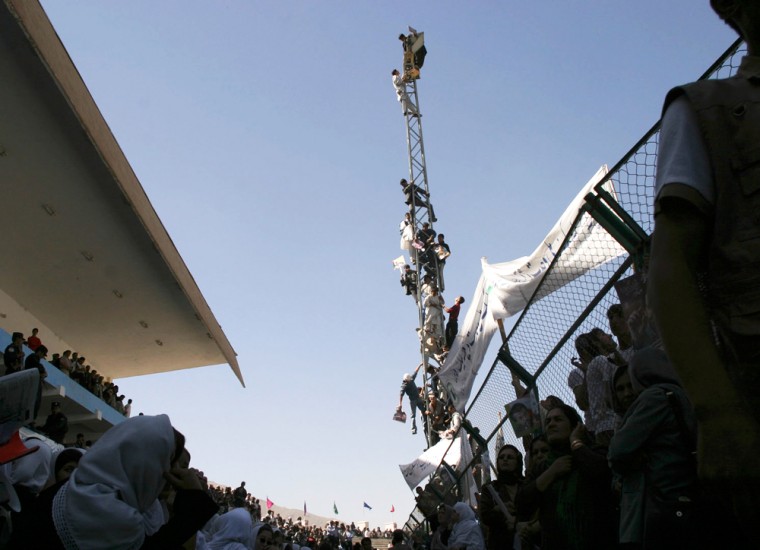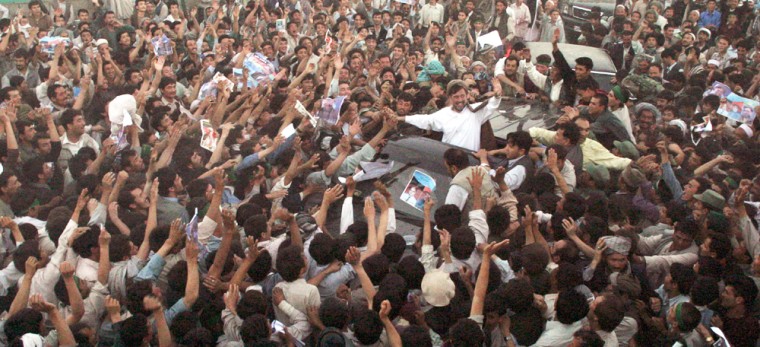More than 1,000 leathery, turbaned men gathered in a cavernous village mosque Friday for a presidential campaign rally. They no longer carried rifles, and some had even brought their small sons. But the assembly of mujaheddin, or former anti-Soviet fighters, crackled with esprit de corps.
The veterans were all ethnic Pashtuns, and the rally was held in Kandahar province, the heartland of Afghan Pashtun culture and the birthplace of President Hamid Karzai, who comes from a prominent Pashtun tribe and has courted Pashtun votes in his bid to be elected president this Saturday.
But these tough ex-fighters had come to show their support for someone else: Yonus Qanooni, the former interior and education minister and an ethnic Tajik, who is Karzai's major challenger. To them, the candidate's ethnicity mattered far less than his credentials as a fellow mujahid and defender of Islam.
"We have all sacrificed a great deal, and we all lost brothers and fathers in the fight for our country," said Asadullah, a farmer in the crowd. "We want a leader who is a true mujahid, so our rights will be protected. We are all one tribe and one nation. We don't like Karzai. We want Qanooni."
A challenge to Karzai
With Afghanistan's first-ever presidential election just days away, analysts here predict that Karzai, 47, will garner the most votes. He remains by far the best known of the 18 candidates in the race, he is widely regarded as the American choice, and he has the power and perquisites of incumbency.
But the unexpected inroads made by Qanooni, even on Karzai's home turf in southern Afghanistan, make it increasingly likely that Karzai will not win more than 50 percent of the vote. This would require an expensive runoff election that could take several months to arrange, leaving the country in a state of anxiety and political drift.
The popularity of Qanooni among some Pashtun mujaheddin, moreover, suggests that the race may not break down along ethnic lines, as has been widely predicted, but instead become a contest between two clashing visions of Afghan society: one that is modern and Western-leaning and one that is protective of traditional Islamic values.
In Kandahar city, Karzai's campaign aides seemed confident of his success at the polls. Ahmad Wali Karzai, one of the president's brothers and a wealthy Kandahar resident, has been receiving a steady stream of Pashtun tribal leaders from across the south pledging the support of their communities at the polls.
"Ninety-nine percent of the provincial elders have guaranteed us they will vote for the president," Karzai said. "We don't see any strong challenger in any of the six southern provinces. From every district, they keep coming to volunteer. And the local cable channel has given us two channels free to use 24 hours for campaign messages."
Karzai suggested that any local support for Qanooni was limited to a small number of former militia commanders — principally from one Pashtun tribe, the Alokozai — who he said oppose the government program to disarm and demobilize militias nationwide.
"They are against the program, because they want to stay in business with their weapons and troops," he said. He complained that officers under the city police chief, a Qanooni supporter, had taken down thousands of Karzai campaign posters in the city.
There were also reports that militia commanders had removed some heavy weapons from Kandahar last week to avoid turning them over to the authorities. And two new election surveys by international groups found that most Afghans responding, including those in Kandahar, were far more concerned about pressure or abuse from military commanders than about terrorist violence on election day.
Complaints of unfairness
But critics of the government, including campaign aides for several other candidates and the local representative of the Afghan Independent Human Rights Commission, complained that regional officials had been actively working for President Karzai's election and pressuring people to vote for him.

In Kandahar city and the surrounding areas, many residents said they supported Karzai, describing him as a fair and honest man and adding that he is a son of the region. Many seemed to know little about the other candidates, including Qanooni, suggesting that Karzai could win merely by being the only familiar name and face on the lengthy ballot.
But familiarity does not necessarily translate into enthusiasm. Last weekend, a rally organized by Ahmad Wali Karzai for students at a park pavilion in Kandahar was a decidedly anemic affair, attended by about 200 young people who listened politely to a series of speeches but rarely bothered to applaud.
At a tiny market on the city outskirts, a baker said he would vote for Karzai because "when he came, war stopped." But a customer who works as a government clerk interrupted eagerly, saying, "I'm for Qanooni. We need a strong leader and a mujahid. Karzai has just been sitting home and doing nothing."
Security concerns for candidates
Indeed, while Qanooni, 43, whose home base is the Panjshir Valley in northern Afghanistan, has made campaign trips to Kandahar and the western city of Herat, Karzai remains a prisoner of his tight security bubble. Since the campaign began, he has taken more trips overseas than within Afghanistan, and he meets citizens only under the most restricted conditions.
The president's first campaign trip was aborted when a rocket was fired near his helicopter. A trip to northern Afghanistan, where he inaugurated a new highway, was a public relations disaster.
The visit was tightly controlled by the U.S. military and Karzai's U.S.-contracted bodyguards. When a crowd of invited guests surged forward, the guards shoved them back and slapped one, who turned out to be the minister of transportation.
On Tuesday, Karzai made a brief campaign visit to the town of Ghazni, about 75 miles south of Kabul, the capital. He arrived and departed by helicopter, and he was guarded on the ground by several hundred rifle-armed security men.
The president, who called on the crowd of several thousand to "vote for peace and stability," reportedly rebuked his guards for trying to push well-wishers away.
"Ideally, Mr. Karzai should be able to campaign in Bamiyan" in the north "and Mr. Qanooni should be able to campaign in Kandahar," said Fida Mahmad, Qanooni's campaign chief in Kandahar. "All candidates should be able to travel everywhere. We do not want the country to be divided again by tribalism and war. People are tired of dictatorships. We have a new thing called democracy, and within the framework of Islam, that is what we want."
In Sinzari, a dusty town 15 miles west of Kandahar, soldiers were busy putting up Qanooni posters for the rally last Friday, and convoys of four-wheel-drive vehicles disgorged hundreds of mujaheddin. They proudly recounted the history of that spot on the highway, where Afghan guerrillas blocked and destroyed hundreds of Soviet tanks in the 1980s, then chopped them up to be sold as scrap.
The local military commander, who goes by the single name Habibullah, was busy preparing the rally and ticking off lists of tribes that had sent representatives. He said he had a good official relationship with the central government, but his Pashtun heart was clearly with Qanooni, the Tajik mujahid from Panjshir.
"When I was a boy, I carried a Kalashnikov on my shoulder. I do not want my children to carry a gun," he said, adding that he supported militia disarmament. But he complained that Karzai and many of his aides had lived in exile during the country's most bitter years and still keep foreign passports. "I am a citizen and I have the right to one vote," he said, "and it will not be for Karzai."
